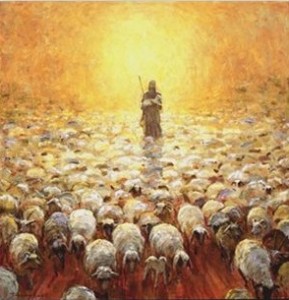Liturgical Readings for : Monday, 18th March, 2024
Monday of the Fifth Week in Lent
Optional memorial of St Cyril of Jerusalem, bishop and doctor of the Church
Both women in the reading today suffered condemnation. Their liberation comes as an act of God’s mercy and promise of help.
FIRST READING (Longer Reading)
A reading from the book of the Prophet Daniel 13:1-9. 15-17.19-30.33-62
Have I to die innocent as I am ?
In Babylon there lived a man named Joakim. He had married Susanna daughter of Hilkiah, a woman of great beauty; and she was God-fearing, because her parents were worthy people and had instructed their daughter in the Law of Moses. Joakim was a very rich man, and had a garden attached to his house; the Jews would often visit him since he was held in greater respect than any other man. Two elderly men had been selected from the people that year to act as judges.
Of such the Lord said, ‘Wickedness has come to Babylon through the elders and judges posing as guides to the people.‘
These men were often at Joakim’s house, and all who were engaged in litigation used to come to them. At midday, when everyone had gone, Susanna used to take a walk in her husband’s garden. The two elders, who used to watch her every day as she came in to take her walk, gradually began to desire her. They threw reason aside, making no effort to turn their eyes to heaven, and forgetting its demands of virtue. So they waited for a favourable moment; and one day Susanna came as usual, accompanied only by two young maidservants. The day was hot and she wanted to bathe in the garden. There was no one about except the two elders, spying on her from their hiding place. She said to the servants, ‘Bring me some oil and balsam and shut the garden door while I bathe.‘
Hardly were the servants gone than the two elders were there after her.
‘Look,’ they said ‘the garden door is shut, no one can see us. We want to have you, so give in and let us!
Refuse, and we will both give evidence that a young man was with you and that was why you sent your maids away.’
Susanna sighed. ‘I am trapped,’ she said ‘whatever I do. If I agree, that means my death; if I resist, I cannot get away from you. But I prefer to fall innocent into your power than to sin in the eyes of the Lord.’
Then she cried out as loud as she could.
The two elders began shouting too, putting the blame on her, and one of them ran to open the garden door. The household, hearing the shouting in the garden, rushed out by the side entrance to see what was happening; once the elders had told their story the servants were thoroughly taken aback, since nothing of this sort had ever been said of Susanna.
Next day a meeting was held at the house of her husband Joakim. The two elders arrived, in their vindictiveness determined to have her put to death. They addressed the company: ‘Summon Susanna daughter of Hilkiah and wife of Joakim’. She was sent for, and came accompanied by her parents, her children and all her relations. All her own people were weeping, and so were all the others who saw her. The two elders stood up, with all the people round them, and laid their hands on the woman’s head. Tearfully she turned her eyes to heaven, her heart confident in God. The elders then spoke.
‘While we were walking by ourselves in the garden, this woman arrived with two servants. She shut the garden door and then dismissed the servants. A young man who had been hiding went over to her and they lay down together. From the end of the garden where we were, we saw this crime taking place and hurried towards them. Though we saw them together we were unable to catch the man: he was too strong for us; he opened the door and took to his heels. We did, however, catch this woman and ask her who the young man was. She refused to tell us. That is our evidence.’
Since they were elders of the people, and judges, the assembly took their word: Susanna was condemned to death. She cried out as loud as she could, ‘Eternal God, you know all secrets and everything before it happens; you know that they have given false evidence against me. And now have I to die, innocent as I am of everything their malice has invented against me?’
The Lord heard her cry and, as she was being led away to die, he roused the holy spirit residing in a young boy named Daniel who began to shout, ‘I am innocent of this woman’s death!’
At which all the people turned to him and asked, ‘What do you mean by these words?’ Standing in the middle of the crowd he replied, ‘Are you so stupid, sons of Israel, as to condemn a daughter of Israel unheard, and without troubling to find out the truth? Go back to the scene of the trial: these men have given false evidence against her.’ All the people hurried back, and the elders said to Daniel, ‘Come and sit with us and tell us what you mean, since God has given you the gifts that elders have.‘
Daniel said, ‘Keep the men well apart from each other for I want to question them.‘

When the men had been separated, Daniel had one of them brought to him.
‘You have grown old in wickedness,’ he said ‘and now the sins of your earlier days have overtaken you, you with your unjust judgements, your condemnation of the innocent, your acquittal of guilty men, when the Lord has said, “You must not put the innocent and the just to death.” Now then, since you saw her so clearly, tell me what tree you saw them lying under?’
He replied, ‘Under a mastic tree.‘
Daniel said, ‘True enough! Your lie recoils on your own head: the angel of God has already received your sentence from him and will slash you in half.’
He dismissed the man, ordered the other to be brought and said to him,
‘Spawn of Canaan, not of Judah, beauty has seduced you, lust has led your heart astray! This is how you have been behaving with the daughters of Israel and they were too frightened to resist; but here is a daughter of Judah who could not stomach your wickedness! Now then, tell me what tree you surprised them under?’ He replied, ‘Under a holm oak.‘
Daniel said, ‘True enough! Your lie recoils on your own head: the angel of God is waiting, with a sword to drive home and split you, and destroy the pair of you.‘
Then the whole assembly shouted, blessing God, the saviour of those who trust in him. And they turned on the two elders whom Daniel had convicted of false evidence out of their own mouths. As prescribed in the Law of Moses, they sentenced them to the same punishment as they had intended to inflict on their neighbour. They put them to death; the life of an innocent woman was spared that day.
The Word of the Lord. Thanks be to God
___________________________
Alternative First Reading (Shorter Form) Dan 13:41-62
Have I to die innocent as I am ?
Susanna was condemned to death by the whole assembly. She cried out as loud as she could,
‘Eternal God, you know all secrets and everything before it happens; you know that they have given false evidence against me. And now have I to die, innocent as I am of everything their malice has invented against me?’
The Lord heard her cry and, as she was being led away to die, he roused the holy spirit residing in a young boy named Daniel who began to shout, ‘I am innocent of this woman’s death!’
At which all the people turned to him and asked, ‘What do you mean by these words?’ ~
Standing in the middle of the crowd he replied, ‘Are you so stupid sons of Israel, as to condemn a daughter of Israel unheard, and without troubling to find out the truth? Go back to the scene of the trial: these men have given false evidence against her.’
All the people hurried back, and the elders said to Daniel,
Come and sit with us and tell us what you mean, since God has given you the gifts that elders have.’
Daniel said, ‘Keep the men well apart from each other for I want to question them.’
When the men had been separated, Daniel had one of them brought to him. ‘
You have grown old in wickedness,’ he said, ‘and now the sins of your earlier days have overtaken you, you with your unjust judgements, your condemnation of the innocent, your acquittal of guilty men, when the Lord has said, “You must not put the innocent and the just to death.” Now then, since you saw her so clearly, tell me what tree you saw them lying under?’
He replied, ‘Under a mastic tree.
Daniel said, ‘True enough! Your lie recoils on your own head: the angel of God has already received your sentence from him and will slash you in half.’
He dismissed the man, ordered the other to be brought and said to him, ‘Spawn of Canaan, not of Judah, beauty has seduced you, lust has led your heart astray! This is how you have been behaving with the daughters of Israel and they were too frightened to resist; but here is a daughter of Judah who could not stomach your wickedness! Now then, tell me what tree you surprised them under?’
He replied, ‘Under a holm oak.’
Daniel said, ‘True enough! Your lie recoils on your own head: the angel of God is waiting, with a sword to drive home and split you, and destroy the pair of you.’
Then the whole assembly shouted, blessing God, the saviour of those who trust in him. And they turned on the two elders whom Daniel had convicted of false evidence out of their own mouths. As prescribed in the Law of Moses, they sentenced them to the same punishment as they had intended to inflict on their neighbour.
They put them to death; the life of an innocent woman was spared that day.
The Word of the Lord. Thanks be to God
Responsorial Psalm Ps 22
Response If I should walk in the valley of darkness no evil would I fear.

1. The Lord is my shepherd; there is nothing I shall want.
Fresh and green are the pastures where he gives me repose.
Near restful waters he leads me, to revive my drooping spirit. Response
2. He guides me along the right path; he is true to his name.
If I should walk in the valley of darkness no evil would I fear.
You are there with your crook and your staff; with these you give me comfort. Response
3. You have prepared a banquet for me in the sight of my foes.
My head you have anointed with oil; my cup is overflowing. Response
4. Surely goodness and kindness shall follow me all the days of my life:
In the Lord’s own house shall I dwell for ever and ever. Response
Gospel Acclamation 2 Cor 6: 2
Glory to you, O Christ, you are the Word of God!
Now is the favourable time; this is the day of salvation.
Glory to you, O Christ, you are the Word of God!
GOSPEL

A reading from the Gospel according to John 8:1-11
If there is one of you who has not sinned, let him be the first to throw a stone at her.
Jesus went to the Mount of Olives. At daybreak he appeared in the Temple again; and as all the people came to him, he sat down and began to teach them. The scribes and Pharisees brought a woman along who had been caught committing adultery; and making her stand there in full view of everybody, they said to Jesus,
‘Master, this woman was caught in the very act of committing adultery, and Moses has ordered us in the Law to condemn women like this to death by stoning. What have you to say?’ They asked him this as a test, looking for something to use against him. But Jesus bent down and started writing on the ground with his finger. As they persisted with their question, he looked up and said,
‘If there is one of you who has not sinned, let him be the first to throw a stone at her.’
Then be bent down and wrote on the ground again. When they heard this they went away one by one, beginning with the eldest, until Jesus was left alone with the woman, who remained standing there. He looked up and said,
‘Woman, where are they? Has no one condemned you?’
‘No one, sir’ she replied.
‘Neither do I condemn you,‘ said Jesus ‘go away, and don’t sin any more.’
The Gospel of the Lord. Praise to you, Lord Jesus Christ.
Gospel Reflection Mon. 24 March, Fifth Week of Lent John 8:1-11
The story of Jesus and the woman caught in the act of adultery is one of those gospel stories that we find ourselves drawn to. The portrayal of Jesus in the story is one that stays with us. We are struck by the contrast between the way the scribes and the Pharisees relate to the woman and the way that Jesus relates to her. The religious leaders have condemned her of a serious breach of the Jewish Law, one that is worthy of the prescribed punishment, death by stoning. Jesus, however, refuses to condemn her; ‘I do not condemn you’. As the evangelist, John, says a little earlier in his gospel, ‘God did not send the Son into the world to condemn the world, but in order that the world might be saved through him’. Rather than condemning her, Jesus pardons her and calls her to a way of life more in keeping with God’s purpose for her life. We may not have sinned in the way the woman sinned, but we are all sinners. We all come before the Lord as people who have not lived in accordance with God’s will and purpose for our lives. The reading assures us that when we come before the Lord in our sinfulness, we will not hear a word of condemnation, but a word of forgiveness. ‘I do not condemn you’, and also an invitation, ‘Do not sin anymore’. Condemnation comes easily to human nature. Thankfully, it is not in the nature of Jesus or of the God whom he reveals. Forgiveness for our past and empowerment through the Spirit to live more loving lives are the Lord’s gifts to us.
_________________
The Scripture Readings are taken from The Jerusalem Bible, published 1966 by Darton, Longman and Todd Ltd







![#KingdompadiMusicVid: James Akinwumi | Our God [@MinisterjamesOF]](https://www.kingdompadi.com/wp-content/uploads/2025/03/WhatsApp-Image-2025-03-03-at-15.05.04_acb15277-150x150.jpg)





